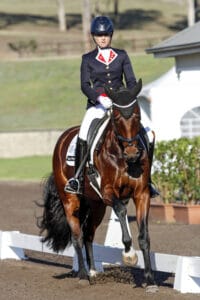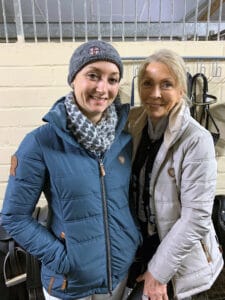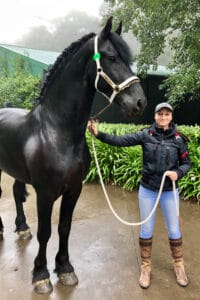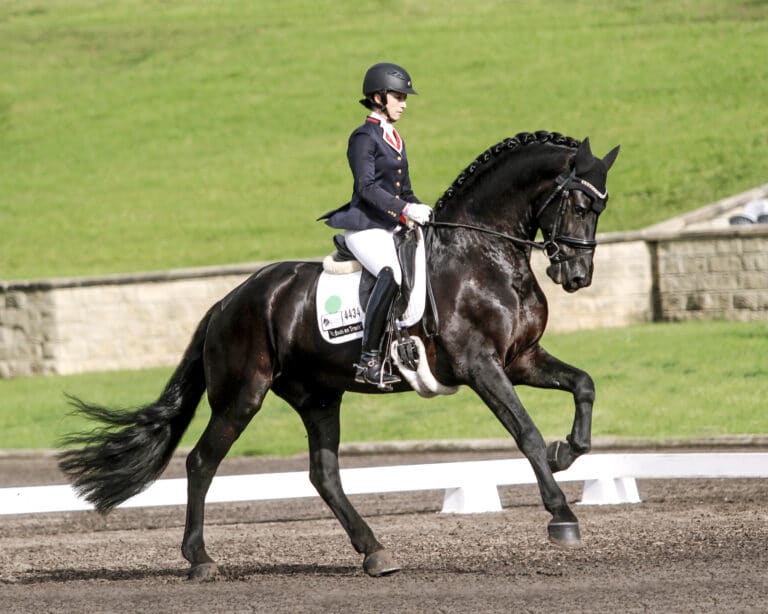One of Australian’s best known dressage riders, Daniella Dierks’ achievements were not handed to her on a plate. She spoke to AMANDA MAC about the early days, her successes, her priorities, and life since COVID.
Picture this: a very small girl is perched on the back of a large Thoroughbred. She’s wearing a pink bicycle helmet and although she’s holding the reins, she isn’t actually in control. That’s down to dressage doyenne Judy Dierks, who’s expertly lunging from the ground. And underneath the pink helmet? That’s Judy’s daughter Daniella, off to an early start on what will become a successful career as a top dressage rider.
The memory causes Daniella some amusement: “In those days riding helmets weren’t a huge thing, so I think my bike helmet had to do. Back then it was more like throw yourself on a horse and if you fall off, get back on,” she laughs.
I’m willing to bet that Daniella isn’t the only rider who remembers that somewhat random approach back in the day, nor is she the only rider who grew up in a horsey household. But in her case, that influence probably had a more laser-like intensity than in most. The Dierks’ are unashamedly, and very successfully dressage orientated. Her father Clemens is a renowned German-born dressage coach, and mother Judy, also an international coach, has a long string of major successes to her name, including winning the Sydney Royal Grand Prix on OTT Thoroughbred stallion Galoubet just two months before giving birth to Daniella.
Daniella’s first pony arrived on the scene when she was three. Clemens had been coaching at a clinic in Victoria when he spotted the pony, an unbroken colt, which he promptly bought and took home for his daughter. “It was pretty much a disaster from what I can remember,” Daniella says, “poor Judy had the task of breaking him in and I don’t think I rode that pony successfully until I was much older.”
Frisky colt notwithstanding, Daniella’s introduction to competition was on her black pony Robin at the Kellyville Riding Club. Now known as the Hawkesbury Riding Club, it’s one of the largest in the Sydney region. Daniella is still a member to this day and often teaches there at clinics.
By applying persistent pressure (some might call it nagging) Daniella succeeded in coercing the time-strapped Judy into taking her to the Kellyville Club every other Sunday. “We’d usually get there late. She’d unhitch the float and then go home, and was often pretty late picking me up too.” And that Daniella completely understands: “It would be the same for me now if I had a child. You’re so time-consumed in this job. Judy was often away competing, and Clements was always away at that point because as an Olympic coach he was running clinics both interstate and in New Zealand. So my grandmother looked after me a lot of the time. I learned to be independent pretty quickly, and yes, I was a bit of a free range child,” she chuckles.
One of the perks of being free range is having a significant length of free rein, which Daniella didn’t hesitate to use. Although those early competition experiences were in the dressage arena, the young Ms Dierks had no particular interest in being a dressage rider. “I wanted to be an eventer. I remember doing small dressage competitions at the club, but I also remember doing quite a few gung-ho one day events there on my pony as well,” she gleefully recalls.

Danielle and protégé SPH Santarina competing during the2018 Sydney CDI(Image by Amy-Sue Alston).
As she grew older her dream of eventing burned ever bright. But perhaps not too surprisingly, it didn’t seem to be overly well supported by her parents, who, Daniella says, bought her an eventer who preferred not to jump and a bucket of a saddle that was noticeably unfit for purpose!
Although an enthusiastic equestrian up until her mid-teens – she was a member of the school team – it was in Year 10 that for a relatively short period, Danielle stopped riding. It had become more of a pressure than a pleasure: “I’d go to school, come home, and have to ride. And you’re also at the age where you’re starting to go out and get some sort of social life with your friends. So yeah, it turned from something I enjoyed into something that became a task.”
But the tide turned mid-way through Year 12, when Daniella began riding again as an antidote to the relentless pressure of her HSC studies, “it helped me take my mind off it,” she explains.
With end of year exams completed and her school days over, Daniella devoted more time to her sport and rode in several competitions. But by February of the following year, life was turned on its head. Judy and Clemens had decided to send their daughter to Hof Kasselmann P.S.I., the internationally renowned German training centre, famous for coaching young riders and producing promising horses. The Dierks had built a strong connection with the Kasselmann family over the years and believed that this was where their daughter needed to be. “I think the plan was that I would train and learn to work harder, and maybe also to have someone else deal with me being teenaged,” she laughs.
Fast tracked to Germany at the age of 18, Daniella admits she wasn’t well prepared. It was her first job and although she was an upcoming young rider, she was still “very much a kid”. And there was another problem. She didn’t have a good pair of top boots, a must-have in European equestrian circles. “I had gators and a pair of Judy’s old riding boots, which I had to wear with thick socks because they were too big. All I can say is good luck to you if you go to Germany and you don’t have decent riding boots.” Clearly it was a confronting experience!
That particular February also happened to be one of the coldest on record. Typical of a European winter, the days were endlessly gloomy. And the work was hard. In her role as a riding groom she was allocated two horses to ride, while grooming for one of Kasselmann’s head riders who had a list of 18 to 20 horses to work through each day. “So it was get up in the morning, and from there it was non-stop: get a horse, wash it off, put it away, and then get the next one, and the next one, and the one after that. It was a hell of a lot of walking all day and it definitely got me fit,” she says of that time.
But during her 12 months at Kasselmann’s, I’m thinking that challenges aside, there must have been some very significant pluses. Daniella is quick to agree: “Oh, absolutely. Just being surrounded by good horses, young horses, high level horses – and the standard of riders I was amongst. In the indoor arena there might be eight horses going round, and just being in that environment makes you ride better. You’d look over your shoulder at other riders and think I have to sit up straighter, or I really need to sort this problem out, whatever that problem happened to be.”
She tells me that while she had a good sitting trot before going to Germany, it was nothing like the balance and stability she had when she left. “At 18 I was your average kid who hated sitting trot and only rode it in dressage to get through the test. But when I came back I did sitting trot everywhere, and to this day I still prefer it.”
Another bonus was learning to be disciplined, along with developing the mindset needed to ride through discomfort, and to solve problems independently. While help was at hand if needed, the onus was on Daniella to learn to ride and to ride well because, as she points out, “the Kasselmann horses weren’t toys.”
With her European sojourn at an end, she returned home a year older and considerably wiser. There followed a brief interlude working for her parents before she was offered and accepted the job of horse manager at Vision Valley, a Wesley Church recreation centre where she’d held down a part time job while still at high school. But after 12 months Daniella returned home: “I recognised that I needed to find my feet and decide whether to look for another job, or settle in to working alongside Judy.”
As it happened, the timing of a possible mother daughter team at the helm of C & J Dierks Advanced Dressage Training Centre was off by a whisker. Julie Farrell of Mulawa Arabian Stud contacted Judy looking for a dressage coach for Kate, her young daughter. Judy had taken Kate for a few lessons, but the Farrell’s were interested in a live-in coach who could also manage the stud’s performance program.

In Ankum, Germany-Daniella and Judy Dierks, a dressage dynasty (Image courtesy Daniella Dierks).
And so began Daniella’s seven year stint at Mulawa, where serendipitously, she finally got the chance to event. “When I first arrived they had maybe four horses in their performance team, one of which was a Warmblood Arabian cross – a very pretty gelding but unfortunately not the best mover for dressage,” she recalls. “I told Julie that he wasn’t likely to get super marks, so why didn’t I see if he could jump. So I trained him in jumping and he turned out to be the bravest and most confident eventing horse, and he loved it.” And so did Daniella, who took him from novice to 1*. It was a wonderful interlude, a “bit of relief”, she admits, from the main focus of presenting and showing the Mulawa horses nearly every weekend.
But after a busy and very successful seven years, it was time for a change. Sadly though, it was also the end of eventing for Daniella. Did she miss it? “Absolutely! That was tough and so was leaving the horses. I’d developed strong bonds with a lot of advanced and well-educated horses there that I’d trained.”
However, after returning home and setting herself up again, she had no trouble in picking up some very good horses. Within the first six months she was riding Jenny Rapson’s FEI horse Rosetta. An interesting mare, Daniella felt that as part of her training she needed to go and do something out of the sandpit. “Occasionally I’d take her down to Kellyville Riding Club to pop her over some cross country and show jumps. So I have jumped since Mulawa, but yeah, it’s a bit of a loss no longer having that avenue, even if it was at lower levels,” she says regretfully.
In the nine years since she’s been home, Daniella has had many stand out successes on some superb horses. Partnered by World Royal, she made a clean sweep of the 2013 Australian Dressage Championships just before the stallion was put into quarantine prior to travelling to Germany. “It was our final competition. I already knew he’d be sold – so that was pretty hard. And he didn’t just win everything, he did it in top form,” she recalls, and there’s a hint of sadness in her voice.
And then along came her new partner, Solo Feliz. After comfortably taking out Champion of Champions at the 2015 Australian Young Horse Championships, the pair moved on to the 2018 Sydney CDI to become FEI Small Tour Champions. Their reward for achieving the best scores in the FEI Prix St George, the FEI Intermediate 1*, and the FEI Intermediate Freestyle, which, at the time, was one of Solo’s first freestyle events, was to take home the John Lieutenant Memorial Trophy.
And to add a more than generous layer of icing to an already rich cake, Judy then made a clean sweep with Diamond Star. “That was quite a highlight,” Daniella reckons, “taking out both the Big Tour and the Small Tour as a mother and daughter team.”
Hot on the heels of this success came another significant win. In the first, and to date the only time Daniella has competed at Boneo, Solo excelled in the Australian Championships. “After 12 hours of travel and some interesting challenges, we won the Prix St George with a great 70 per cent score, and then won the Intermediate 1* and the Freestyle. He came away with rugs for every class – he was laden with stuff,” she laughs.
But for Daniella, there are considerations over and above winning ribbons and rugs – and it’s where things get very personal. “I’ve become acclimatised to competitions because I’ve grown up with them. I don’t think I’ve ever been nervous as I come down a centre line. I’m so focussed and have such a big job ahead of me that I haven’t time for that.” she says. “What’s more important to me are the hours and hours you spend at home, days and days, when you hit road blocks that have to be overcome when you’re training each horse.”
There are few top riders who wouldn’t agree that behind the scenes it’s plain hard work, devoid of even the smallest glint of show ring glamour. “And why do we do it?” questions Daniella. “Well, for me, it’s because I want to have that relationship, that ability to control the horse with aids of such high sensitivity that they’re almost invisible. And we need to have that responsiveness when we ask for it, on cue, without fail, every time. It’s all about the quality of my horse’s response to me – and if that can be achieved, then to me, that’s a win.”
Other than World Royal and Solo Feliz, there are other horses that Daniella has loved – either for their talent, or their big hearts – and in some cases lost. Springing immediately to mind are Concordance, Grand Prix horse Luxor, and Mulawa’s imported Grand Prix stallion Aber Hallo, who Daniella remembers as a “super sensitive person”.
And right now? She has six horses in training, “a nice number” she tells me. Danielle works all her horses six days a week: a day’s lunging or in-hand work, and the remainder ridden. The degree of input necessary for each horse varies of course, depending on their maturity and level of education. FEI horses already know the ropes, and don’t require much time. However, younger horses, and a few have come Daniella’s way since COVID, take much longer, particularly if they’re fresh from the breakers. “It can make it hard to get through the day,” she says, “because I have to give each horse as much time as they need.”
For the rider, that work load can be taxing, mentally as well as physically. “It’s physical when you’re trying to fix things with an uneducated horse, but when your horses have that high level of training and they’re good at it, it becomes more mental. Timing, rhythm, and sensitivity to aids become very real,” Daniella explains. “You have to be thinking of a thousand things. It’s like being in an aircraft cockpit. You’ve got hundreds of buttons around you, then one warning light starts flashing followed by another. You’ve got to be aware of all those warnings and deal with them.”
Since losing Rosetta and Solo Feliz, her two FEI horses, the cream of Daniella’s current crop is Tjibbe B, a stunning young Friesian stallion also owned by Jenny Rapson. “I advised Jenny to purchase Tjibbe as a four-year-old, and she put quite a bit of trust in me in recommending a very hairy, heavy stallion – quite different to the very elegant Rosetta,” Daniella laughs. “I actually had Tjibbe in training before Jenny purchased him, so she’d seen me riding him and loved all the hair and mane that was flying around!”

Daniella and Tjibbe B at Robertson in the NSW’s Southern Highlands (Imagec ourtesy Daniella Dierks)
The shift from FEI horses to relatively uneducated youngsters is significant. But as Daniella points out, changes to your team represents just one of the challenges at the top level of dressage. So how do you overcome those obstacles? “Easy! You just get a very tough skin, and lose your sense of humour,” she jokes before slipping into a more reflective mood. “Look, I think any professional who gets to the top level has already developed a pretty high tolerance, because it’s not smooth sailing. But you see people around you and realise that it’s not just you having to deal with setbacks, pressure and change. There are other riders who’ve lost a horse, or who are carrying an injury, or are under pressure because they’ve got owners who understandably have expectations. And that’s not to say that we don’t hugely appreciate our owners, because we wouldn’t be here without them. But the horse’s future is always in the owner’s hands – and you just have to get used to that.”
Nonetheless, every horse Daniella trains, she trains as if it were her own. But she does maintain a degree of separation. “They’re not yours so you don’t necessarily invest your heart and soul in them. You’re being paid to do a job, so that distances you slightly. Then when there’s loss, or changes of outcomes, you’re better prepared to deal with them.”
Daniella is equally pragmatic when I ask about the future: “It’s really up in the air,” she sighs. Her annual work program has undergone a considerable shift. Going interstate twice a month to coach and teach at clinics was a routine that was pretty much second nature until COVID. And with so many competitions called off or in the balance, she really doesn’t have the future neatly mapped out. “Sure, there’re the Olympics and WEG, which is actually bigger than the Olympics for an equestrian, and they’re the pinnacle of everything you work towards, but none of us know when they’ll be held again,” she muses.
Without a horse at Grand Prix level, or even approaching it, Daniella mentions she’d be happy to go to the Tokyo Olympics as a coach. I notice the promise of sushi and sake holds definite appeal. “Seriously though,” she chuckles, “it would actually be fabulous whether I was riding or not. And that would go for any future games too. As a coach I’d be very proud, and have a great sense of achievement to have taught someone who’s made it to that level. Because you know what? It’s not all about being in the saddle.”
And that’s perhaps a little piece of wisdom we’d all do well to ponder.
Feature Image: With stunning young Friesian stallion Tjibbe B at the 2019 Sydney CDI (Imageby Amy-Sue Alston).



